I recently visited Victoria Baths in Manchester, winner of the B.B.C. 2003 Restoration programme. They have an archives section that contains many swimming pictures, documents and other objects relating to swimming history. While there I was shown a picture of John Henry “Rob” Derbyshire which reminded me of the confusion around the team that represented Great Britain at the 1900 Olympics water polo competition and if Derbyshire had actually been a member of the winning team.
-
Victoria Baths, Manchester
venue for water polo matches and a number of galas involving Derbyshire
Photograph taken by Mark Evans
John Henry “Rob” Derbyshire was born in Manchester in 1878. His father, John, was the superintendent of the Osborne Street Baths in Collyhurst, Manchester. It is said he received the name “Rob” when his father used him as a periscope during a demonstration at the baths and he was nicknamed “The little Robin” which later became just “Rob”
- John Henry “Rob” Derbyshire.
He competed at the interim Olympic Games at Athens in 1906 in the 100 metres, 400 metres freestyle and the 4 x 250 metres relay where the team gained third place. In the London Olympics of 1908 he competed in the 100 metres and was a member of the 4 x 200 metres gold medal team and finally in the Stockholm Olympics in 1912 he swam in the 100 metres freestyle. He won 10 A.S.A. championship titles. He held four world records, 100 yards freestyle (twice), 150 yards freestyle and 220 yards freestyle. He was also a fine water polo player, playing for the Osborne Swimming Club.
-
Site of the former Osborne Street Baths
The home of the Osborne Swimming Club, as it is now.
Photograph taken by Mark Evans
He moved into baths management and worked at Old Trafford Baths co-founding Old Trafford Swimming Club. He eventually moved to London with his wife Alice and formed the Penguin S.C. He acted as British Olympic swimming team manager at both the 1928 Games in Amsterdam and 1936 in Berlin. He died in 1938 at the age of 59.
Derbyshire was indeed an important figure in British swimming history, but was he a member of the team who won the gold medal in the 1900 Olympic water polo tournament? The 1900 Games were held in Paris with the water polo tournament being held in the River Seine on the 11th and 12th August. Seven teams, representing four nations entered, Osborne Swimming Club from Great Britain, Brussels Swimming and Water Polo Club from Belgium, Berliner Swimming Club from Germany and four teams from France, Libellule from Paris, Pupilles de Neptune de Lille (two teams) and Tritrons Lillois.
The competition rules stated that all swimmers and water polo players had to members of one Club. At the time the Osborne Club was the most successful water polo team in England winning the English Championship water polo title in 1894-5-6-7-8-9- and 1901. They were also a successful swimming team winning the Club Team Championship in 1894-5-6-8-9-1900 and1901. It seemed reasonable then for the Club to be chosen as the British representative. Therefore the whole swimming and water polo team were made ‘members’ of Osborne Swimming Club. ‘The Manchester Courier and Lancashire General Advertiser’ dated Thursday, August 2, 1900 reported,
Next week a team of English swimmers will travel to Paris, in order to represent this country in the International races and water polo competitions. The said team will be under the charge of Mr. W. Henry, the hon. Secretary of the Life Saving Society. In order to comply with the conditions imposed by French authorities, it has been necessary to make all the men members of one club, and the Manchester Osborne have done the men and themselves honour in electing them, for the team consists of many famous swimmers , the list being as follows:- J. A. Jarvis, 500 yards, half mile, mile and long distance champion; F. C. V. Lane, ex-champion of Australia and 220 yards and quarter mile salt water champion of England; J .H. Derbyshire, 100yards champion; W. Henry, ex-quarter mile salt water and long distance champion; R. A. Crawshaw, ex-breast stroke champion; H. C. Winter, captain Zepher Club; F. Stapleton, Nottingham; Peter Kemp, Manchester Osborne, late Leander; A. Campbell, St. James’s; and A.J. Gough, Leander. By these men Manchester Osborne will be worthily represented, and first honours in every open race ought to be captured……
The article lists Derbyshire as one of the team members but does not list the water polo team. On looking at other references there appears to be some confusion to who actually played in the team.
David Wallechinsky in his book ‘The Complete Book of the Olympics’ shows the Great Britain as Osbourne Swimming Club, Manchester, – Arthur Robinson, Thomas Coe, Eric Robinson, Peter Kemp, George Wilkinson, John Henry Derbyshire, William Lister, William Henry, Robert Crawshaw, John Jarvis, Frederick Stapleton and Victor Lindberg.
Wikipedia lists the team as Thomas Coe, Robert Crawshaw, William Henry, John Arthur Jarvis, Peter Kemp, Victor Lindberg and Frederick Stapleton.
The SR/Olympic website notes the team is usually listed as Thomas Coe, John Derbyshire, Peter Kemp, William Lister, Arthur Robertson, Eric Robinson and George Wilkinson. However, it refers to one contemporary source which lists the team as Henry, Crawshaw, Jarvis, Stapleton, Lindberg, Coe and Kemp. It says that Lister had died two weeks before the Games of typhoid fever, Wilkinson had played in a match in Walsall when the Games were on and Robinson and Derbyshire played a match in Manchester, two days after the final. Unfortunately, the site does not list who the contemporary source was. *1
Bob Phillips in his book ‘Britain and the Olympics 1896 – 2010’ says the British team were all members of the Osborne Swimming Club and lists them as, Coe, Derbyshire, Kemp, Lister, Robertson, Robinson and Wilkinson. He adds ‘the following played in one match but not in the final’ and lists the following players, Crawshaw, Henry, Jarvis, Lindberg and Stapleton.
James Bancroft in ‘Olympic Champions in Manchester’ lists the team as Osborne Swimming Club, Manchester, Thomas Coe, John Henry Derbyshire, Peter Kemp, William Houghton Lister, Arthur George Robertson, Eric Robinson, and George Wilkinson.
Who is right? I went back to the newspapers and found the following article in The Daily Telegraph, dated Saturday, August 11, 1900;
One of the most representative teams of amateur swimmers that ever left England’s shores crossed to France last evening, to take part in the International swimming races in connection with the Paris Exhibition, due to the commence in the Seine at Asnieres this morning…… and included J. A. Jarvis, the mile and long-distance champion, and the ex-Australian, F. C. Lane, whose speed up to a quarter of a mile is almost phenomenal. Rob Derbyshire, the hundred yards champion, cannot make the trip, but an efficient substitute has been found in T. Coe, another Manchester swimmer, who is very fast for a short distance. England will be represented by one or more men in every event on the programme, which contains races over 4,000metres, 1,000 metres, 200 metres, 200 metres with obstacles, 200 metres on the back, team racing, and a water polo competition……..
The article states Derbyshire was replaced by another Osborne player, Thomas Coe, the Osborne Swimming Club water polo captain. There is some thought that Derbyshire was in fact ill and so was unable to travel.
-
Thomas Coe
the Osborne water polo captain who replaced Derbyshire in Paris
Further information was found in The Manchester Courier and Lancashire General Advertiser dated Thursday, August 16, 1900, which reported on the results in Paris and listed the team that won the final;
The English Successes in Paris
The success of the Englishmen in the races in Paris on Sunday, and their speed and style fairly astonished the foreign swimmers present, says a correspondent. Jarvis and Lane had no real opponents, and between them placed three out of five events to England’s credit. In the final of the fourth, the back swimming race, R. A. Crawshaw, though he had qualified, did not compete, but in the fifth, which was the water polo championship, the English players won anyhow, the team being :- W. Henry (Life Saving Society), goal; R. A. Crawshaw (Manchester Mayfield) and T. Coe (Manchester Osborne) (captain), backs; P. Kemp (Manchester Osborne), half back; Lindberg (Australia), F. Stapleton (Nottingham) and J. A. Jarvis (Leicester), forwards. As required by the conditions, they had to play under one club name, and that of the Manchester Osborne was selected………………….
Therefore it would appear Derbyshire did not play in the water polo tournament and did not travel to Paris. Perhaps some of the confusion has been created by the fact that the players had to be members of one club, and so it maybe that people assumed that the team who represented Great Britain consisted of the usual Osborne Club players which of course would include Derbyshire.
What we can say though, is the team won the tournament quite convincingly defeating Tritons Lillois (France) in the first round 12 – 0, Pupilles de Neptune de Lille in the semi-final 10 – 1, and Brussels Swimming and Water Polo Club 7 – 2 in the final.
*1. In The Manchester Courier and Lancashire General Advertiser dated August 16th, 1900 article quoted above there is also a report on the Lancashire Cup semi-final between Wigan and Osborne which took place on 15th August 1900, its lists Derbyshire and Wilkinson as scorers for Osborne, who won the game 4 – 2. This could be the game referred to in the SR/Olympic account.
Bibliography
SR/Olympic Sports website
Wikipedia website
The Complete Book of the Olympics, David Wallechinsky (Aurum Press Limited 2000)
Britain and the Olympics 1896 – 2010: a celebration of British gold, Bob Phillips (Carnegie Publishing Ltd 2012)
Olympic Champions in Manchester, James Bancroft (Manchester Free Press, 1993)
The British Newspaper Archive site
The Manchester Courier and Lancashire General Advertiser, Thursday, August 2, 1900 and Thursday, August 16, 1900
The Daily Telegraph, Saturday, August 11, 1900
West London Penguin website

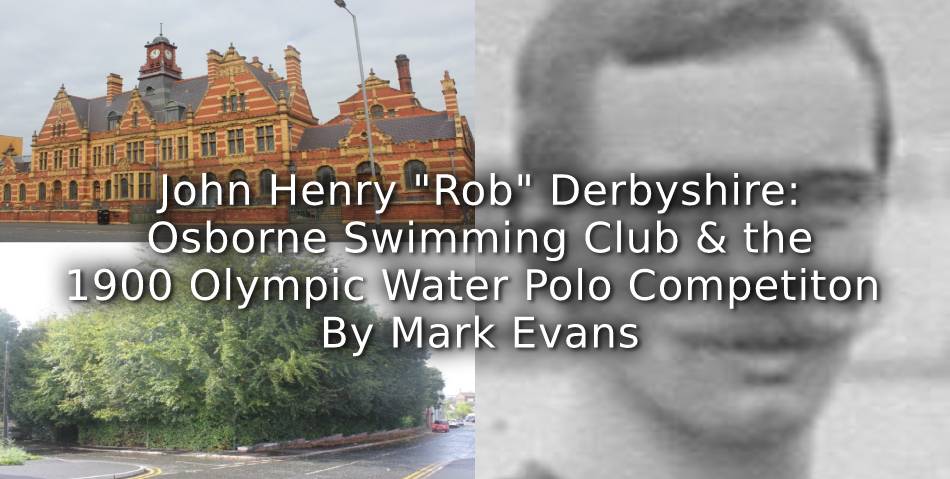
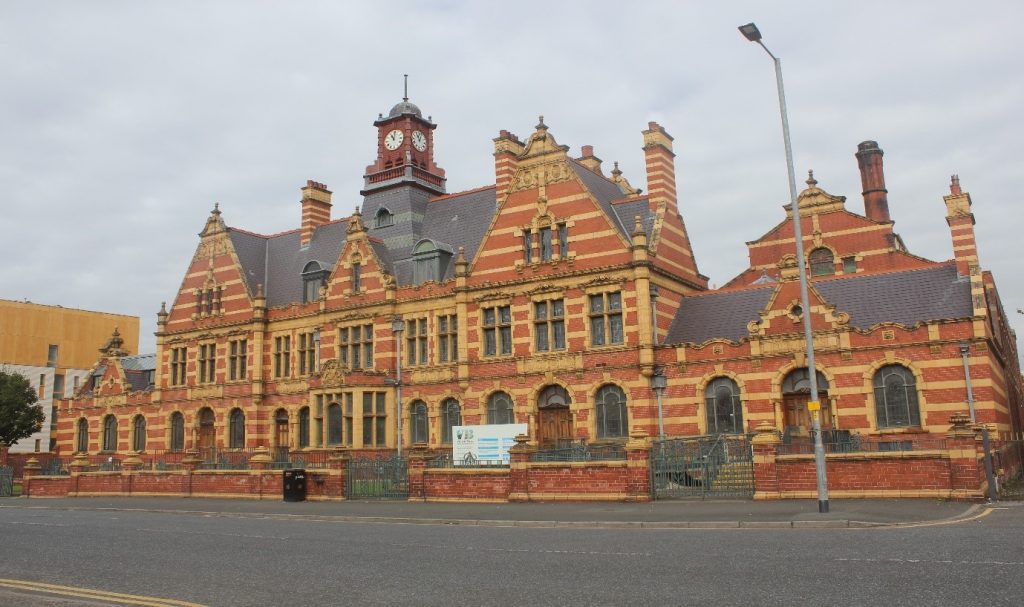
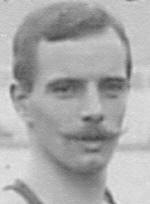
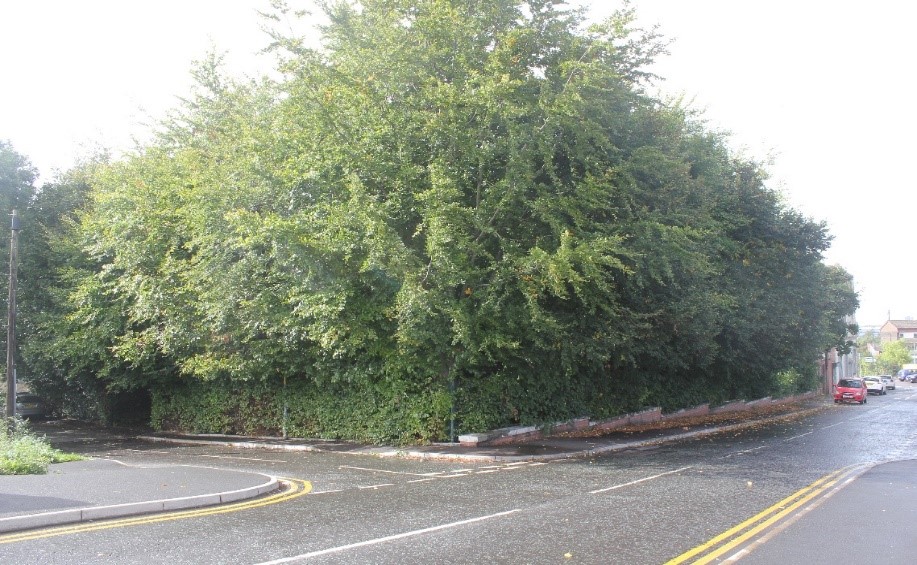
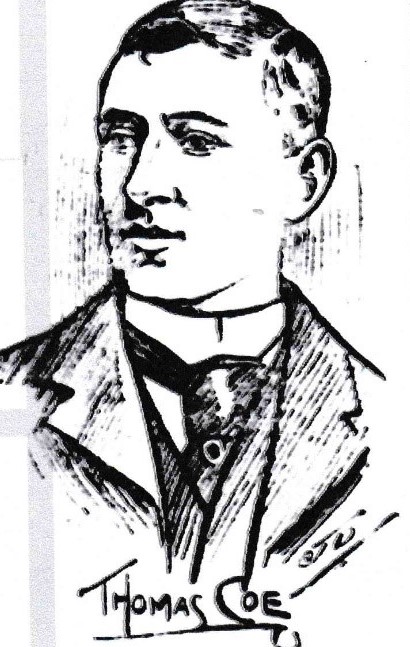
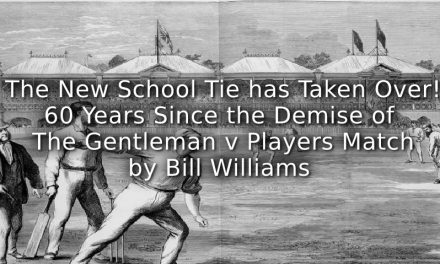
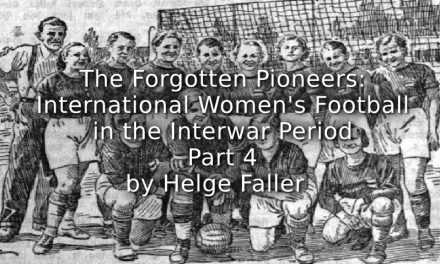

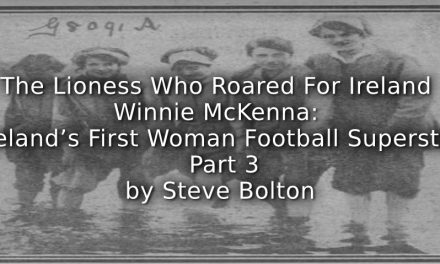
Dear Mark, thank you very much for spot on Derbyshire. You stressed the waterpolo champion. In Austria, he was awaited for unofficial European championships 1897. Probably, he sent the enrollment, but later he did not take part. According Allgemeine Sport Zeitung, in 1899 he was credited to have performed, during training sessions, twice 100 yards less than one minute. If you need references and information, let me know !
Thank you Gherardo. I would be interested in the references you mention as I am looking at doing more research on Derbyshire and the Osborne Swimming Club
Dear Mark, the first is ASZ, 31 July 1897, p. 862. The second one I mistook is 1900 not 1899, 27 October 1900, p. 1198. The journal affirmed that in one checked training session John Henry swam 59.3/5 and the second 59.2/5. I try to recover abstract book of Manchester Forum and I will send through e-mail more references.
That is great. Thank you very much. He was certainly one of the best swimmers of his age.
Well done Mark
I have tried many times to work out whether SR/Olympic Sports website were correct about Rob not being there. They maintained that he couldn’t be in Paris on 12th August as he was in Manchester 2 days later. I have always thought that was not conclusive evidence as in 1912 28 Olympic swimmers managed to take part in an international swimming gala at Victoria Baths two days after the swimming finals at the Stockholm Olympics:
G.A. Godfrey South Africa
A. Kenyery Hungary
N.T. Hatfield Middlesbrough S.C.
L. Szentgrothy Hungary
H.E. Annison Croydon S.C.
K. Huszagh USA
L. Beleznay Hungary
E. De Rimanoczy Hungary
A.W. Hunt City of London Police S.C.
P. McGillivray USA
P. Courtman UK
Ada Langford Liverpool
W. Wylie Australia
F. Durack Australia
J. Fletcher Leicester
Duke Kahanamoku USA (Hawaii)
Harry J. Hebner USA
George Ri Hodgson Canada
H. Hardwick Australia
L. Boardman Australia
C. Healy Australia
N.T. Nerich USA
H.E. Annison UK
J.C. Hatfield UK
H. Taylor UK
C. S. Smith UK
I. Bentham UK
G. Wilkinson UK`
We even have a programme in our archive with some of their signatures on.
I think the Telegraph and The Manchester Courier and Lancashire General Advertiser articles that you have found clinches the issue.
Sadly the excellent SR/Olympic Sports website has announced it is being closed by this Monday coming. I hope all the data is not lost.
Hi,
Ive been researching my grandfathers history and came across your name. His name was Harris, I think it was Thomas, he swam for the Osborne Club at Harpurhey baths. He captained the England team and I have his cap for 1896. I believe, from the ASA archivist that he was amongst the most capped players in the game of water polo along with the legendary J Jarvis of Leicester. I know he “retired” just before water polo became an Olympic sport in 1900, seemed a very young age to retire!
I hope this might be of some interest to you
Regards,
Alan Gemmell
ps he was my Mothers father and she was a champion swimmer too but discouraged ME from swiimming and I learned to swim, of sorts at age 40!!
Hi Barry
Thank you for your comments and the additional information.
Despite not being at the 1900 Olympics, Derbyshire’s story is a fascinating one and his achievements should be more widely known, as with many other swimmers and water polo players from the Manchester area around the same time.
I hope to do another article for the site featuring some of these people in the near future and maybe, one never knows, a book about the rich swimming and water polo history the Manchester area has.
Regards.
Mark Evans
Mark,
Im writing to tell you that my grandfather (Harris) was one of the most capped players in the history of the game f water polo along with the legendary J A Jarvis from Leicester. he Captained the England side in 1986 and, I believe 1988. He was a member f the Osborne Club to which you referred. The archivist at the ASA was kind enough to give me details from their records.
I hope this is of interest to you.
Regards,
Alan Gemmell
Hi Alan
Really sorry for my late reply, but I have only just seen your comments.
Yes, I am very interested in the information you have in relation to your grandfather. I am looking at doing an article for this site in relation to the swimmers and water polo players who came from the Manchester area, as there are lots of them and they were very talented. Any information about your grandfather you can let me have would be great and I could included it in the article.
I will do some research into your grandfather and let you know what I find. I will liaise with the site administrator and see if I am able to pass you my contact details and we could perhaps have a chat.
Regards.
Mark Evans
Hi Mark,
I’m trying to find information about a tour by the Osborne Swimming Club in May 1901. It appears they visited Bristol, Swindon, and Cardiff. Do you know the itinerary?
Thanking you in advance,
Keith.
Hi Keith
Sorry for the late reply. I do not have any information about the tour but I will have a look and see if I can find any information for you.
Regards
Mark
Hi Keith
The Osborne team did indeed travel to the south west in May/June 1901 and swam in a number of galas and played in a number of water polo games. The Osborne team consisted of J. H. Derbyshire, P.H. Lister, E. Robinson, J. W. Shaw, W. Kay, T. Coe, G. Wilkinson, J. Robinson and T. R. Lambie. Their itinerary was Whit Monday, 27th May, G.W.R. Medical Fund Society’s Baths, Swindon, where Coe won a one length handicapped race and Osborne defeated Swindon 7-1 at water polo. On Tuesday 28th May, at Weston-Super-Mare, Derbyshire swam 88 yards against the clock and Lister and Robinson swam a race over six lengths. Osborne won the polo match 8-1. Thursday, 30th May at Swansea, Derbyshire swam an exhibition event, Robinson and Lister raced again and Osborne beat Swansea 8-0 in the water polo match. Friday 31st May at Cardiff, Derbyshire swam against the clock, Lister and Robinson raced over 200 yards, there was a squadron race Osborne v Cardiff and a water polo match, Osborne v Cardiff. The tour finished in Bristol on Saturday, 1st June at the Royal Baths, Kingsdown. This information has come from the BNA site using local papers. Hope that helps
Mark